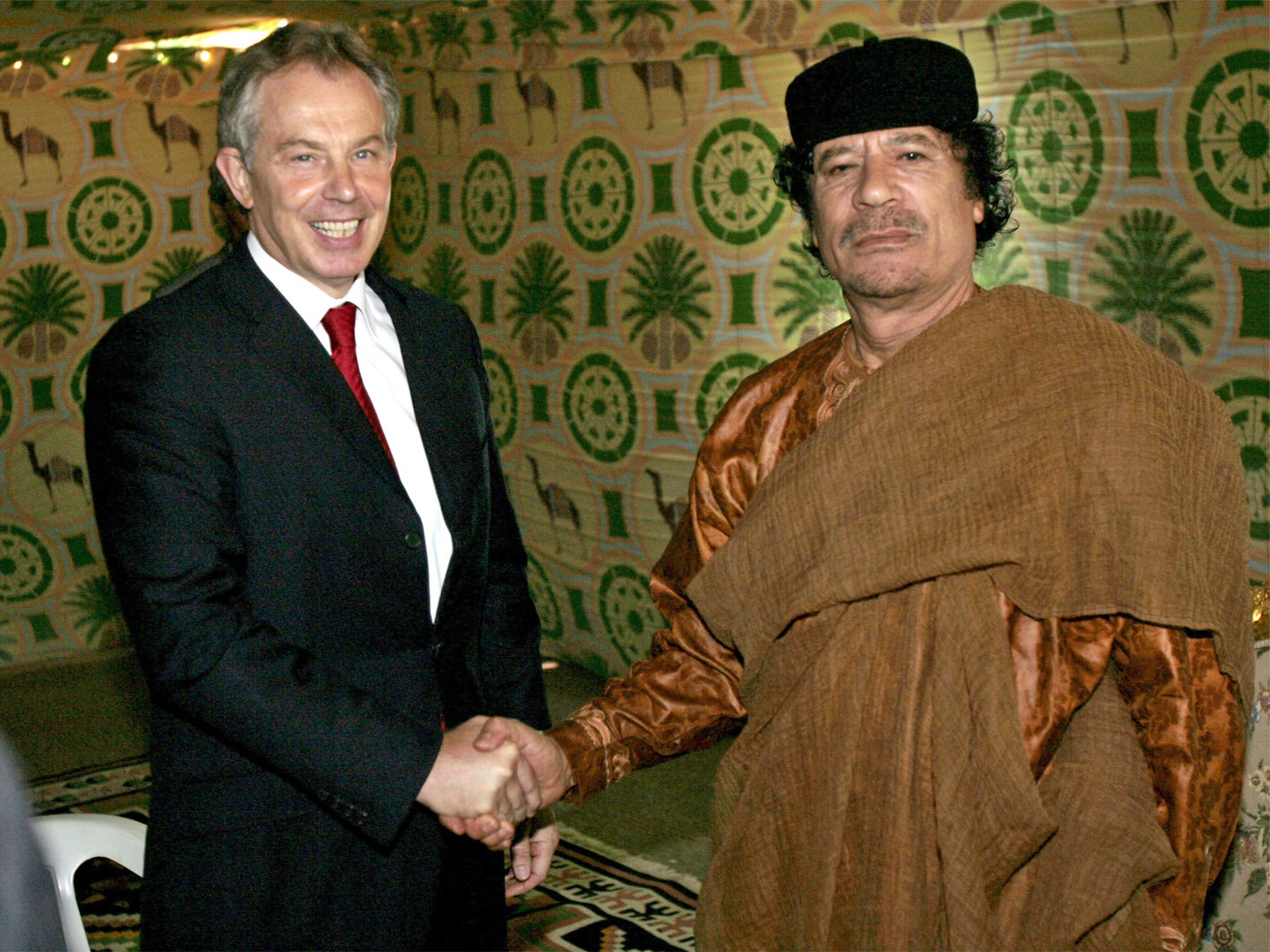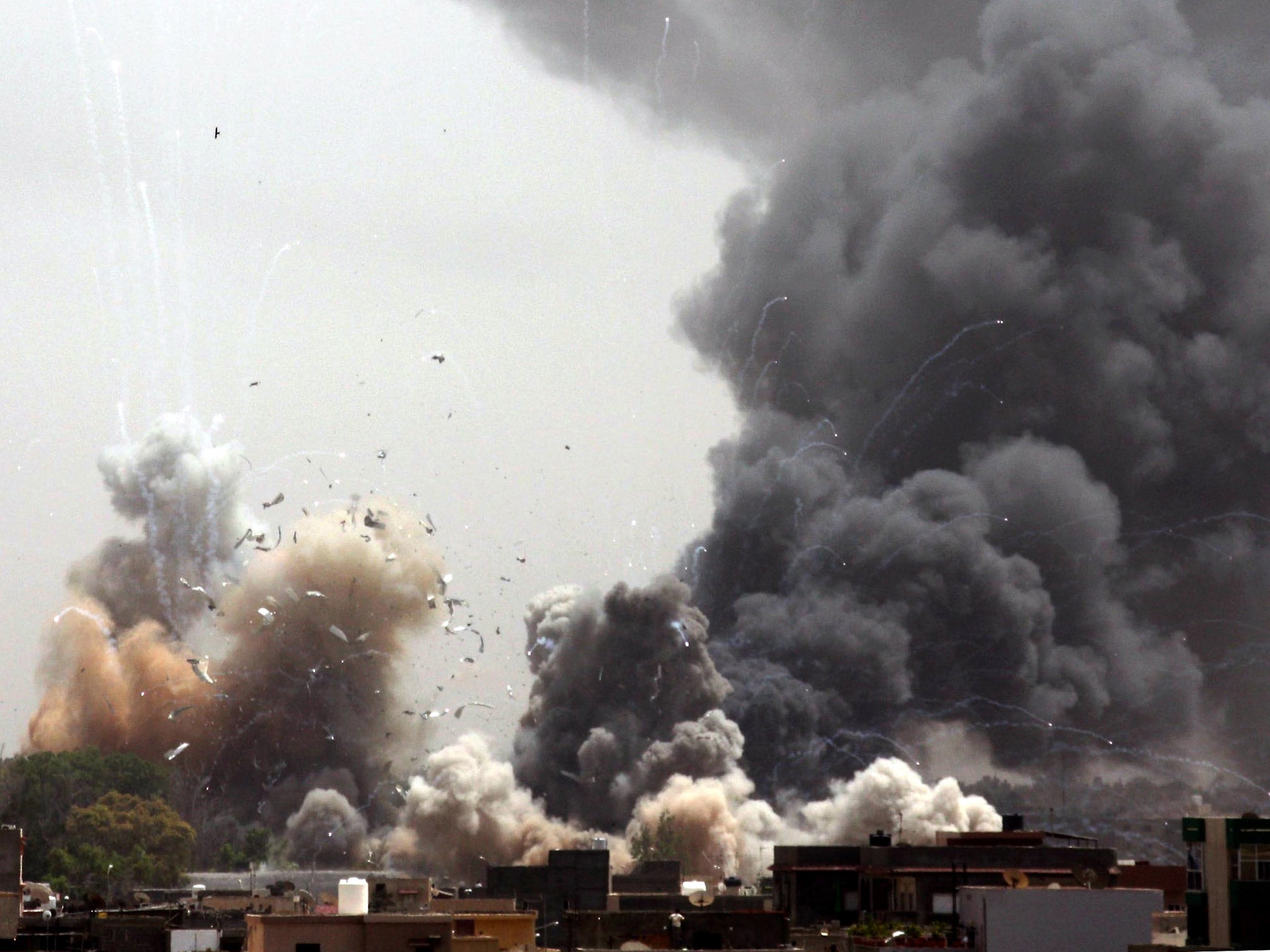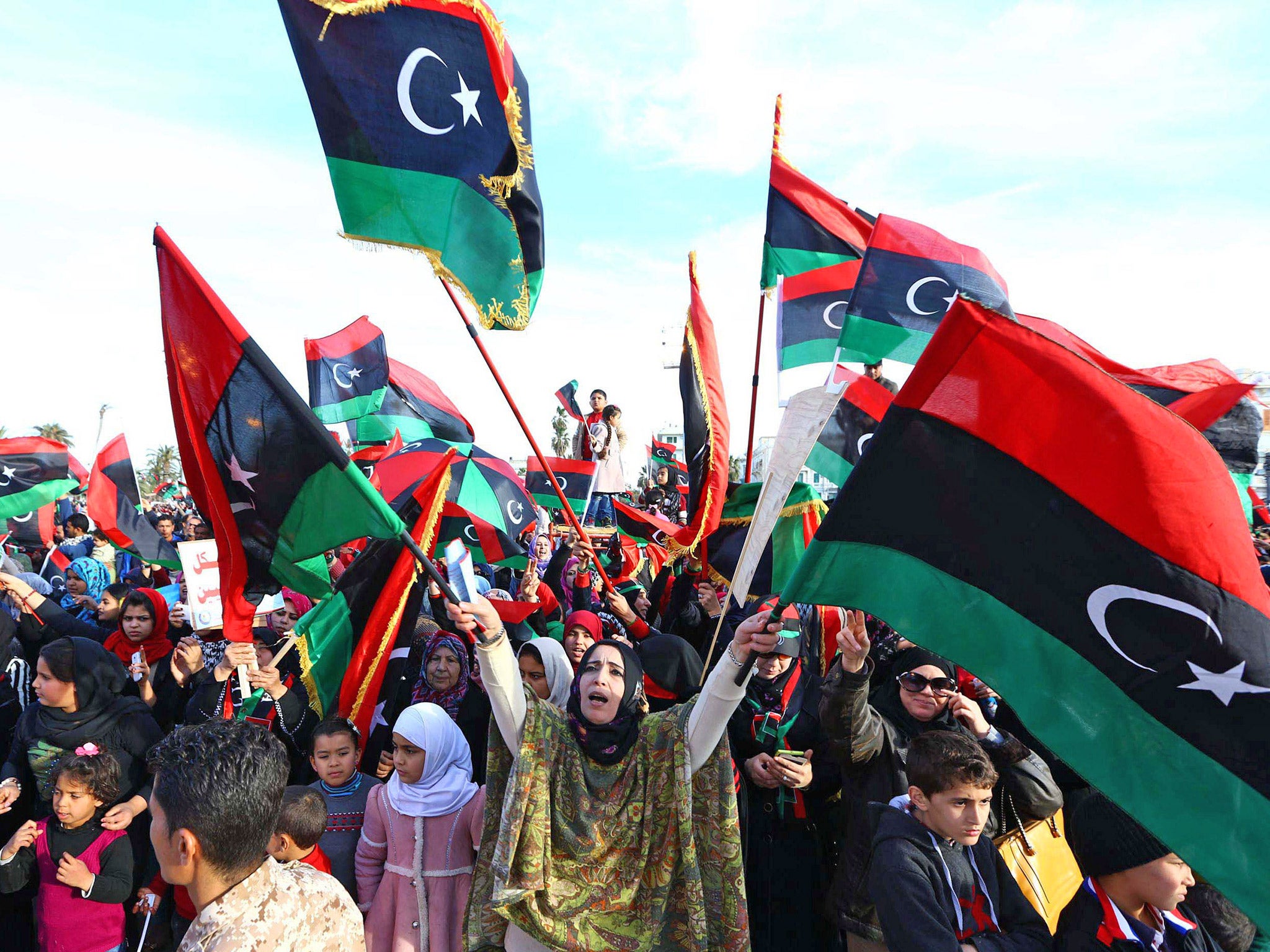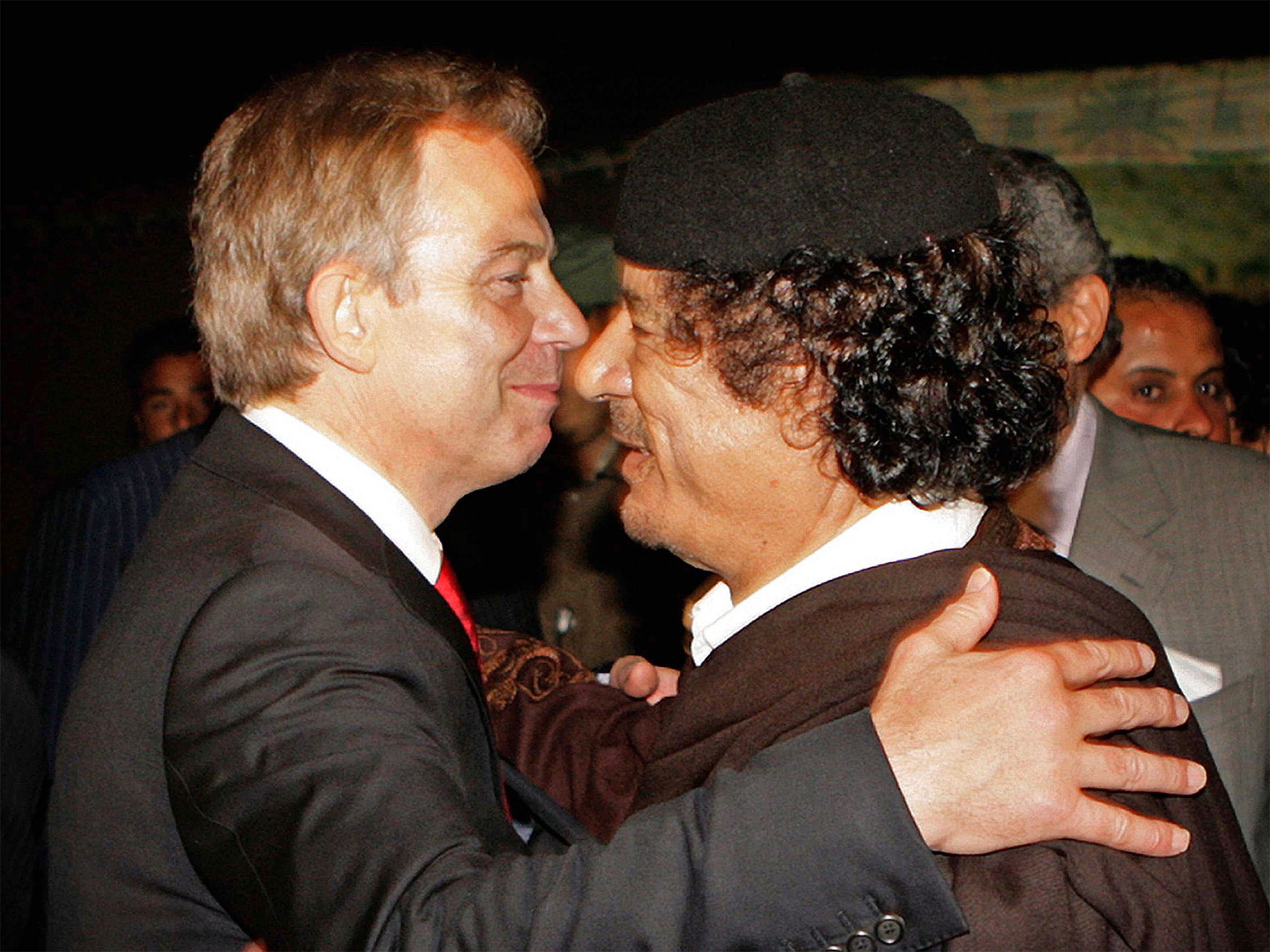Tony Blair and Colonel Gaddafi: The questions the former Prime Minister faces over his ties with Libya
Mr Blair's long-awaited appearance in front of MPs comes as Isis takes advantage of the chaos in the country

Your support helps us to tell the story
From reproductive rights to climate change to Big Tech, The Independent is on the ground when the story is developing. Whether it's investigating the financials of Elon Musk's pro-Trump PAC or producing our latest documentary, 'The A Word', which shines a light on the American women fighting for reproductive rights, we know how important it is to parse out the facts from the messaging.
At such a critical moment in US history, we need reporters on the ground. Your donation allows us to keep sending journalists to speak to both sides of the story.
The Independent is trusted by Americans across the entire political spectrum. And unlike many other quality news outlets, we choose not to lock Americans out of our reporting and analysis with paywalls. We believe quality journalism should be available to everyone, paid for by those who can afford it.
Your support makes all the difference.Tony Blair will be questioned by MPs on Friday about his links with Muammar Gaddafi’s regime and the part these ties played in shaping British policy as Libya degenerated into a failing state torn by division and violence.
The former Prime Minister’s long-awaited appearance before the Commons’ Foreign Affairs Select Committee comes as Isis is taking advantage of the chaotic conditions in the country to set up a stronghold across the Mediterranean, bringing its jihad ever closer to Europe.
The current UK Government inherited its Libya policy from Mr Blair, according to the committee chairman, Crispin Blunt. “He was the one who reset Libya; it was his signal achievement, he has claimed, to disarm Colonel Gaddafi of his weapons, his WMDs”. The reality, Mr Blunt argues, was that Libya’s leader was able to “buy himself out of the sanctions regime” which had constrained him, even though he was “certainly a supporter of terrorists”.
Mr Blair is expected to be asked about collusion on security matters with the regime. This collusion is said to have included the rendition of Tripoli’s opponents to the country’s brutal secret police, as well as claims that Mr Blair sought to intervene with Downing Street on behalf of Col Gaddafi during Libya’s civil war.
The former Prime Minister is also likely to face questions about Libya-related business deals he may have been involved in. Mr Blair’s public engagement with Libya began in March 2004. The full extent of the disaster of the Iraq invasion the previous year had yet to unfold and he was enjoying his role on the world stage as an international statesman.

The meeting with Col Gaddafi took place in a tent in the desert near his home town of Sirte. It led, Downing Street was to stress, to Libya giving up its WMD programme and providing a breakthrough in the hunt for the killers of WPC Yvonne Fletcher. Lucrative benefits included Shell, the Anglo-Dutch conglomerate, signing a £550m gas exploration agreement.
The famous tent had been set up to celebrate Col Gaddafi’s Bedouin heritage. Like his handpicked female bodyguards, it became a symbol of his rule and was taken on his travels. On one occasion, during a trip to the UN in New York, it was pitched on Donald Trump’s Westchester County estate.
Seven years and four months after the Blair meeting, my foreign correspondent colleagues and I watched as rebels looted the tent during the uprising against the regime. The furniture – garish red sofas, Formica tables and ornate lamps – was carted away, while the multicoloured awning was torn into strips and taken as souvenirs.
Two months later we saw Col Gaddafi’s body lying on the floor of a meat warehouse in Misrata. He had been captured while trying to escape from Sirte and murdered; his mutilated body had then been paraded.
Tony Blair, it emerged later, had tried to save the beleaguered Libyan leader, urging him to leave the country as the uprising took hold. At one point the ex-PM is said to have contacted David Cameron asking him to consider a peace deal Col Gaddafi was offering to the UK.
Mr Cameron refused. He, along with the French President Nicolas Sarkozy, had been instrumental in launching the bombing campaign by Nato in support of the Libyan rebels, and his mantra at the time was “Gaddafi must go”. The air strikes continued, the regime fell, and Libya’s disintegration began.
Sirte is now under the control of Isis. Around a thousand Libyans who had gone for jihad in Syria and Iraq have returned to join an insurgent force of 2,500. Increasing numbers of foreign fighters are gravitating to Libya rather than the Middle East. Terrorists trained in Libya have carried out attacks in neighbouring countries including Tunisia, where 38 holidaymakers – 30 of them British – were killed at the seaside resort of Sousse. Libya remains a conduit for weapons fuelling insurgencies in Mali and other African states.
Mr Blair’s main criticism of Mr Cameron’s Libya mission had been that troops were not put on the ground following the overthrow of the regime.
And he can rightly point out to the MPs on the select committee that after his deal with Col Gaddafi the Libyan regime did abandon its WMD stockpiles – which, unlike those that were used to justify the invasion of Iraq, actually existed. In addition, the Libyans also revealed the activities of the Pakistani scientist AQ Khan who had sold stolen nuclear secrets to Libya, North Korea and Iran.
But some of the other successes which were supposed to come from the meeting in the desert did not materialise. The killers of WPC Fletcher were never arrested in Libya. The Libyan rebels produced a suspect, Omar Ahmed Sodani, whom they had caught in Benghazi, for journalists to interview in March 2011; he denied responsibility and has since disappeared.
Last month a former education minister in the Gaddafi regime, Saleh Ibrahim Mabrouk, was arrested at his home in England for alleged conspiracy over the shooting after he had arrived here seeking asylum. But it has been too dangerous for Scotland Yard detectives to carry out investigations in Libya.
One of the most contentious aspects of the relationship between the Blair government and the Gaddafi regime is terrorism. In 2004 the British Prime Minister emerged from the tent in Sirte to say how struck he was that Col Gaddafi wanted to make “common cause with us against al-Qaeda, extremists and terrorism”.

What remained hidden from the public was what making “common cause” entailed. After the revolution, journalists including myself discovered documents in Tripoli charting how British officials had played a part in the abduction of two opposition leaders, Abdel Hakim Belhaj and Sami al-Saadi of the Libyan Islamist Fighting Group (LIFG), and their families, who were then flown to the regime.
Letters subsequently emerged from Mr Blair to “Dear Muammar” apologising because a court in this country had blocked the deportation of exiled opponents of the regime. “I am very disappointed by the court’s decision,” the Prime Minister stressed to Col Gaddafi.
MI5, in an assessment made 11 months after the rendition of Mr Belhaj and Mr Saadi, noted that the two men had jealously guarded the independence of the LIFG. But since their disappearance into the regime’s prison an emergent leadership has pushed for a merger with international terrorist organisations.
Two years later a new leader, Abu Laith al-Libi, announced that LIFG was joining al-Qaeda. Libi went on to organise suicide attacks in Afghanistan against American and British targets before being killed in a drone strike.

Critics claim the Gaddafi regime’s policy of repression, backed by the Blair government, helped fuel anger on the streets of Libya, which led to the revolution and its aftermath of strife and extremism. Mr Saadi, meanwhile, has received compensation of more than £2m from the British government; his fellow victim of rendition, Mr Belhaj, continues to pursue legal action in London.
Mr Blair’s connection with Libya continued after leaving office. It was reported that he had visited Tripoli on a number of occasions, at least twice on a private jet allegedly paid for by the Gaddafi regime. One of the visits was in January 2009. At the time JPMorgan, which was paying Mr Blair £2m a year as an adviser, was trying to negotiate a deal between the Libyan Investment Authority (LIA) and the aluminium production conglomerate Rusal; this was owned by the Russian oligarch Oleg Deripaska, a friend of Peter Mandelson who had also funded an environmental project run by Mr Blair. JPMorgan later pulled out, but LIA went on to buy $300m of Rusal shares.
Mr Blair and JP Morgan have both insisted that the former Prime Minister knew nothing about the negotiations the bank was conducting in Libya. But Mr Blair’s business affairs, along with his political judgement, continues to be a subject of critical scrutiny.
Join our commenting forum
Join thought-provoking conversations, follow other Independent readers and see their replies
Comments